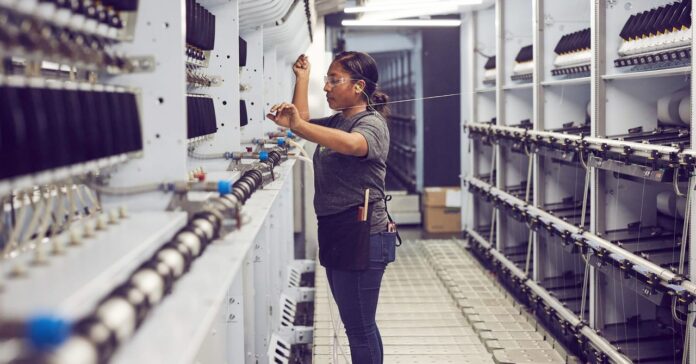Within the bottle processing plant in Reidsville, North Carolina, drifts of plastic particles, like snow banks, are piled in each nook of the equipment that chops the bottles into flake. After I ask our tour information, a flooring supervisor, if he worries about respiration it in, he says he would not. “We do a good job of cleaning it up,” he says, including that the baggage of mud which are vacuumed up are offered off, and the wastewater is filtered.
However I’m involved. A 2023 study of a UK plastics recycling plant discovered that even after the set up of state-of-the-art filters, round 6 % of the plastic being processed was launched into the wastewater as micro and nanoplastic, whereas the air across the facility was stuffed with microplastics sufficiently small to be hazardous to human well being.
Scientists are nonetheless puzzling out what microplastics do to our well being, however one study discovered that individuals with IBS tended to have extra microplastics, together with PET and polyamide (of which nylon is one sort), of their intestine. Whereas PET appears to be some of the benign out of all of the plastics, not less than two studies have discovered BPA, a hormone-disrupting chemical, in polyester child clothes, and plenty of manufacturers agreed to a settlement with California lawmakers in 2023 over the presence of BPA in polyester athletic shirts.
As well as, water utility managers in Reidsville have alleged that Unifi and different polyester producers may very well be doubtlessly be sources of 1,4-dioxane, a possible human carcinogen, within the Cape Concern watershed, which supplies consuming water for over 1 million people because it flows from central to southeast North Carolina. Technically, that’s not unlawful (particularly since Unifi, together with different industrial sources and several other cities, successfully lobbied in opposition to a North Carolina rule limiting 1,4-dioxane in wastewater). As a result of 1,4-dioxane is a byproduct of producing PET resin, the EPA declared in late 2024 that just about any publicity to 1,4-dioxane constitutes an unreasonable threat to the well being of polyester employees and surrounding communities. There are (very pricey) methods to deal with wastewater for 1,4-dioxane, so how ensuing laws would have an effect on Unifi stays to be seen, particularly because the EPA doesn’t at the moment appear eager to do any regulating of poisonous chemical publicity.
Ingle and Boyd each declined to talk intimately about these points. In particular person, they cited the recommendation of Unifi’s counsel (BPA), stated Unifi follows all laws (1,4-dioxane), or pled ignorance (microplastics). Observe-up inquiries to Boyd went unanswered. Ingle responded to follow-up questions by way of e-mail by writing, “We maintain active participation in The Microfibre Consortium, in order to support academic and industry research into the source and impact of fiber fragmentation from textiles into the natural environment.” And “We are compliant with all local, state, and federal regulations for all of our sites.”
To advocates, every micro-scandal is proof that there isn’t any environmentally pleasant polyester. “We can’t do this sustainably in a nontoxic way, it’s literally impossible,” Pecci says.
However I left the Repreve plant questioning if we’re letting excellent be the enemy of excellent American jobs. Polyester will proceed to be in demand, and it’ll both be made right here in a compliant manufacturing facility utilizing recycled sources, or overseas in a sketchy manufacturing facility utilizing recent petrochemicals. Pecci says she doesn’t need to “call out that company or those people, because they might be the nicest people in the world doing the best they can with what they have.” She described for me a utopia wherein unhazardous and pure clothes is all made right here after which composted and recycled right here. Sounds attractive, and unimaginable.
In February of this 12 months, Unifi announced it was closing its Madison, North Carolina, polyester processing plant. It might ship a few of its equipment to its Latin American crops, and supply the Madison workers new job alternatives on the Yadkinsville and Reidsville crops, which stay in service.
For now, anyway.
#Recycled #Polyester #Saved #American #Manufacturing unit #Environmentalists #Hate


